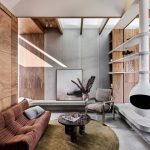Integrated design for kitchens
With so many stunning bespoke kitchens within residential projects it is not surprising that we all aspire to live within those homes and spaces. And, with so much inspiration out there, it’s not surprising that modern developers are looking to create similarly inspirational spaces within their developments, particularly kitchens.
Today kitchens are not separate rooms but part of a wider living space and design conscious homeowners want these spaces to be part of a cohesive whole and receive the same design consideration and detailing.

GALLERY



One of these sophisticated trends that we see being applied is the integration of appliances, offering the ability to customise the product panels to match the kitchen style so that the boundaries of the kitchen cabinetry and appliances are blurred.
With this in mind, how can developers and designers tap into integrated design to make it more appealing to the buyer?
WHAT IS INTEGRATED DESIGN?
An integrated kitchen can be summed up with one word: hidden.
Traditionally, appliances were inserted into spaces in the cabinetry and were made of contrasting materials, such as stainless steel. They often physically stuck out, rather than flowing into the surrounding interior architecture.
The integrated design approach allows appliances to be easily concealed within the cabinetry, giving the kitchen clean lines and a uniform material palette.
In addition, appliance designs are being refined so even the ones that can’t be fully concealed — like cooktops — can lie flush with other surfaces, allowing the kitchen to maintain a cohesive aesthetic flow, or have a refined material palette so that there is a sophisticated balance of materiality.
WHAT ARE THE ADVANTAGES OF AN INTEGRATED KITCHEN?
For the modern developer, an integrated kitchen ticks the right boxes. The look is in high demand from buyers, so having a kitchen that resonates with their needs and wants is critical.
Contemporary homes also emphasise open plans, with an underlying sense of flow.
Many premium kitchens feature integration, selecting appliances that can be installed with panel fronts to match the rest of the kitchen and create a cohesive overall look of the wider space.
Integration offers the ability to customise, so that the style of choice can be applied – to suit the design intent – from traditional to sleek and modern, it creates a continuous cohesion with the rest of the space and the design is not broken up by appliances or elements that visually disrupt the overall aesthetic.
HOW DO KITCHEN APPLIANCES WORK IN AN INTEGRATED KITCHEN?
In an integrated kitchen, the focus can be taken off the appliances. They can be concealed while still providing high performance and efficiency for buyers.
Many products can all be easily installed with custom panels to match the surrounding cabinetry. And, pyrolytic ovens, with minimalistic black panelling and discreet interfaces, provide a contemporary look, matched with easy-clean functions. Induction and gas-on-glass cooktops lie flush with countertops, allowing the kitchen to flow around them.
Via The Urban Developer in collaboration with kitchen appliance experts Fisher & Paykel.
The Clipsal Solis™ Collection is a premium range of switches and power points that blend smart technology, sustainability, ...
The Committee for Geelong has unveiled an ambitious $1 billion vision to transform the Market Square site from ...
Perched atop a modernist monolith, a 19th-century Lorrain-style house appears to hover above the skyline of Metz, France. This ...
New York-based studio Parts and Labor Design has redefined the classic American diner with its sophisticated refresh of ...
The Hug House is a masterclass in spatial layering, material richness, and seamless indoor-outdoor integration. Designed to embrace its ...








